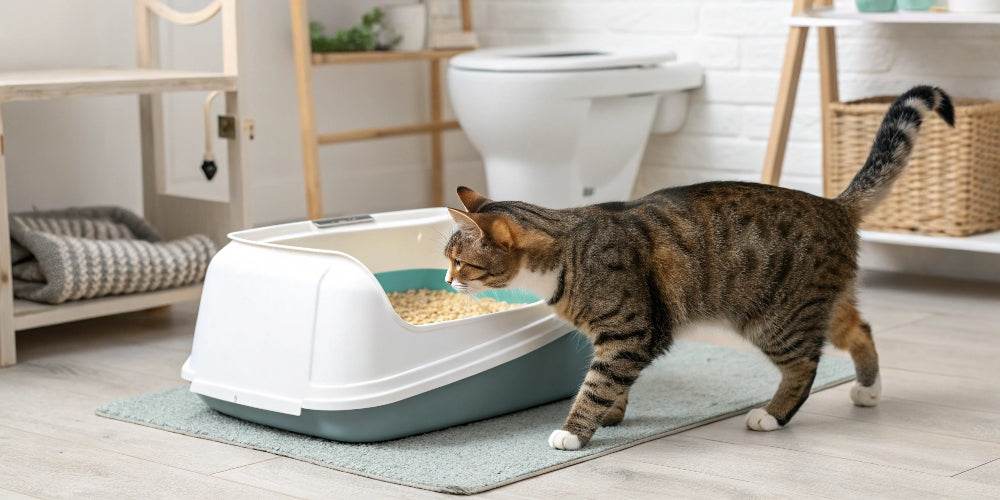
How to train a cat to use the litter box?
Our feline friends are among the cleanest pets around. They take care of their own hygiene by licking themselves daily, making our intervention practically unnecessary. However, there are times when we will need to train them in certain tasks, such as grooming. use the cat litter box properly.
If we adopt a cat, we should keep in mind that it may have lived in a "wild" environment, so using a specialized litter box for its needs won't be high on its list of priorities. In the case of small or newborn kittens, this won't be a problem, as they usually learn from their mother's actions, which will make our work easier during the training process.
Regarding this topic, there are several questions that may come to mind, such as: At what age do cats use the litter box? Why doesn't my cat urinate in the litter box? Among many others. Whatever your question, don't worry, we'll answer many of them in this article. Keep reading!
When do cats start using the litter box?
During the first few weeks of life, the kitten is still a very young baby, so it won't be able to control where it does its business. At most, it will follow in its mother's footsteps, trying to learn how to survive its new adventure.
It is approximately from 4 weeks when a cat starts using its litter boxThe main reason is because they need a place to deposit and hide their feces, as their animal instinct prompts them to do so so that the scent doesn't attract predators and they become prey. They want to avoid danger at all costs, and this is the best way to cover their tracks.
If your furry friend doesn't learn to use the litter box instinctively or directly from his mother's behavior, read on for tips from the Arquivet team.
Where to put the cat litter box?
The first recommendation is to ensure that your cat finds a clean litter box as soon as he gets home. If you show him where it is, his instinct will lead him to use it to bury his poop or pee.
The best place to put the cat litter box will be a quiet place, where the animal can relieve itself calmly, quietly, and as comfortably as possible. Keep in mind that it should also be an accessible location, so you can easily change the litter when necessary and clean the area properly. Some interesting locations could be the kitchen, living room, or terrace, depending on the availability in your apartment or house. We also recommend that, for hygiene reasons, the area where you place your cat's food be slightly away from the "bathroom and hygiene" area.
The best litter boxes for cats
The next step is to find the best litter box for your cat. Just like people, animals need comfort when defecating or urinating. That's why you should select a litter box that meets their needs. Some key factors to consider are:
- Amplitude: The bigger the litter box, the better. Large litter boxes are perfectly fine for any cat. The cat should be able to move around and turn around if necessary. They should feel they have enough space and mobility.
- Size: Not all cats are the same. When it comes to buy a cat litter boxYou'll need to consider your pet's size. A small cat will need a litter box that's tailored to its size. If it's too large, it might even have difficulty accessing it. If this happens, we won't be making it easy to use, and therefore, it will continue to pee or poop outside the litter box.
- Guy: There are different options, from a closed cat litter box to an open litter tray. The advantage of closed litter boxes is that you won't be able to see the cat's feces, and the odor will be lessened. However, it's best to remove feces and urine from the area as quickly as possible to keep the litter box clean and in perfect condition. This will be a key factor in getting your cat to use the litter box.
There are also designer cat litter boxes that combine elegance with practicality. If you're a style-conscious person, this may be your best option.
Cat treats: a good ally
During the training process, we can use cat snacks The goal is to create a positive feeling in our pet and reinforce their good deeds. This will help us emphasize that what they've done is right, and therefore, the animal will continue doing it, knowing there's a reward associated with it.
The rewards can be food, very common are salmon or malt snacks, but They can also be toysPlacing a ball, mouse, feathers, or any other item that catches your cat's attention can be a great way to get your cat to the desired area: the litter box.
Choose a quality cat litter
There are many types of cat litter on the market, and it's vitally important to choose wisely, as this can be a deciding factor in whether your cat uses the litter box or ignores it. The most common types are:
- Mineral cat litter
- Clumping cat litter
- Silica cat litter
- Natural cat litter
If you want to know more, you can check out our article on cat litter.
Other curiosities about cats and the use of litter boxes
Sometimes our cat scoops litter out of the litter box. This usually happens during the process of going to the bathroom. Their usual procedure is to enter the litter box, scoop out litter to make a hole, then defecate or urinate inside, and then stir the litter again to cover it. During this process, some litter may spill out of the litter box.
To prevent this from happening, The best recommendation is to keep the litter box as clean as possible.Cats hate dirt, and the dirtier their litter box, the more they'll dig and stir to find a clean area, increasing the chances of them scooping litter out of the box.
If the litter box is very dirty or the litter hasn't been changed frequently, the pet may avoid using it, as it will sense that the area isn't clean and will move on to another spot.
On the other hand, a behavior that you should pay close attention to if you detect it is If your cat lies down in the litter boxThis could be an indication that the cat is suffering physically or even experiencing stress and anxiety. If so, the cat may not be using the litter box properly, and the best thing to do in these situations would be to take the cat to your trusted veterinarian to determine exactly what's wrong and provide the best solution.
Finally, you may have wondered if two cats can use the same litter boxIndeed, they can, although it's always advisable to have as many litter boxes as there are cats, so that each one has its own space.


